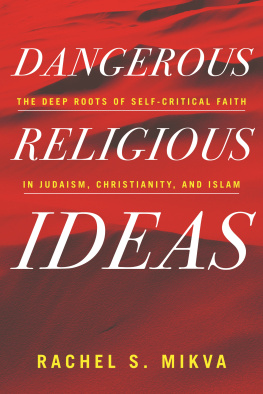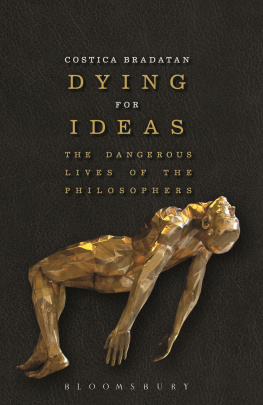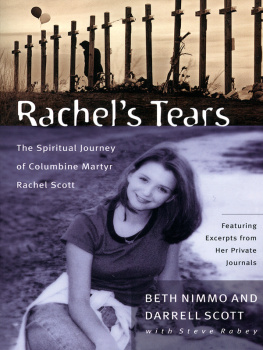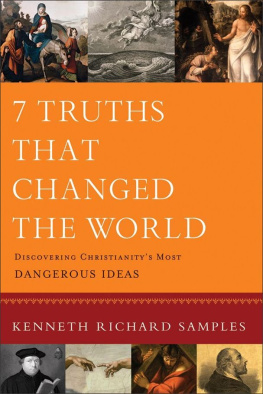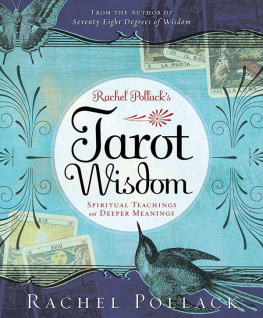Rachel S. Mikva - Dangerous Religious Ideas
Here you can read online Rachel S. Mikva - Dangerous Religious Ideas full text of the book (entire story) in english for free. Download pdf and epub, get meaning, cover and reviews about this ebook. year: 2020, publisher: Beacon Press, genre: Religion. Description of the work, (preface) as well as reviews are available. Best literature library LitArk.com created for fans of good reading and offers a wide selection of genres:
Romance novel
Science fiction
Adventure
Detective
Science
History
Home and family
Prose
Art
Politics
Computer
Non-fiction
Religion
Business
Children
Humor
Choose a favorite category and find really read worthwhile books. Enjoy immersion in the world of imagination, feel the emotions of the characters or learn something new for yourself, make an fascinating discovery.
- Book:Dangerous Religious Ideas
- Author:
- Publisher:Beacon Press
- Genre:
- Year:2020
- Rating:3 / 5
- Favourites:Add to favourites
- Your mark:
- 60
- 1
- 2
- 3
- 4
- 5
Dangerous Religious Ideas: summary, description and annotation
We offer to read an annotation, description, summary or preface (depends on what the author of the book "Dangerous Religious Ideas" wrote himself). If you haven't found the necessary information about the book — write in the comments, we will try to find it.
Dangerous Religious Ideas — read online for free the complete book (whole text) full work
Below is the text of the book, divided by pages. System saving the place of the last page read, allows you to conveniently read the book "Dangerous Religious Ideas" online for free, without having to search again every time where you left off. Put a bookmark, and you can go to the page where you finished reading at any time.
Font size:
Interval:
Bookmark:


This book is dedicated to my father, Abner Joseph Mikva (zl), who spent his life trying to make profoundly good but still imperfect systems... better.
The most intense love that humanity has ever known has come from religion, and the most diabolical hatred that humanity has known has also come from religion.... No other human motive has deluged the world with blood so much as religion; at the same time, nothing has brought into existence so many hospitals and asylums for the poor; no other human influence has taken such care, not only of humanity, but also of the lowest of animals, as religion has done. Nothing makes us so cruel as religion, and nothing makes us so tender as religion. This has been so in the past, and will also, in all probability, be so in the future.
N o one asked the Hindu monk Swami Vivekananda to prove these assertions during his 1896 lecture in New York, and some are surely exaggerations. His pronouncement rang true because it articulated the consternation felt by so many about the role of religion in human history. People value their faith for its capacity to inspire goodness, fashion meaning, connect communities, and open gateways to the sacred. At the same time, they have long recognized and struggled with the ways in which religion is wielded as a weapon to oppress people, to deepen division and justify violence.
The recent flurry of publications about the destructive power of religion should not suggest it is a recent discovery; historical events simply pushed it more to the center of our attention at the beginning of this twenty-first century. Most of these discussions, however, focus on holy war, fundamentalism, and other limited aspects of religious experience. When I begin my course on Dangerous Religious Ideas, I first ask my class what they would put on the syllabus. Primarily faithful Christians studying for a master of divinity degree, the students hesitate briefly. They frequently start with someone elses ideas; reflecting the current climate of anti-Muslim bias that infects even progressive and pluralist spaces, jihad is almost always mentioned first. Then we get to extremists of all flavors. As students start to think more critically about their own traditions, however, they quickly realize that just about any religious idea could make the list: God, scripture, Messiah, sin. The board quickly fills with all the essentials of faith, each at some time having played an integral role in devastating harm.
ALL RELIGIOUS IDEAS ARE DANGEROUS
All religious ideas are dangerous, including those embraced by moderates and progressives. Take God, for instance. Faith in a divine being has at times inspired murderous intolerance for those who do not share it. This is undoubtedly an extreme example, but even today atheists find it difficult to get elected to public office in the United States. Indeed, over 40 percent of Americans assert that one must believe in God in order to be an ethical person. Theists in opposing camps on reproductive justice, gun safety, tax policy, and a host of other divisive issues frequently presume that God is on their side, while heaping moral condemnation on their adversaries. God becomes an idol carved in our own image, a yes-man who endorses our politics and prejudices.
Scripture has been used to uphold slavery and condemn LGBTQ+ individuals, to inflict harsh punishment and legislate discrimination. Presumptions of its divine source and perfect quality have led to heresy trials, burning of books, resistance to scientific learning, and aggressive suppression of countervailing ideas. Even those who try to read scripture critically sometimes find themselves internalizing negative impressions about religious others or defending rotten ideas. My students, for example, are surprised when they realize how much of the New Testaments anti-Pharisaic polemic they have absorbed and how it has shaped their understanding of Judaism. Even though they know better, they catch themselves denigrating the law as contrary to the spirit and suggesting that ancient Judaism was too parochialprompting Paul to invent universalism (like Al Gore invented the internet).
Some people claim that destructive and hateful expressions are not real religion: the great religions of the world are, in essence, religions of peace, love, and goodness. Such essentialism identifies manifestations of religion that stray from these values as deviant or heretical. Ironically, this attitude is not all that different from that of fundamentalists who believe their interpretation of religious tradition to be the only authentic one. It also fails to recognize that even this idealized vision carries dangerous power. Peace can be (and has been) the value that perpetuates injustice, love the emotional catalyst for oppressive interference, and goodness a culturally constructed perspective imposed on others. We may believe that certain embodiments of religion are not what God wants or that they are not worthy expressions of our tradition. We can definitely argue that oppressive teachings claiming to rely on literal interpretation of scripture are still filtered by human hands, but we cannot declare that such things are not religious. Given the textual and historical record, it is fair to conclude that religion can be expressed violently and nonviolently, with grace or cruelty, as Swami Vivekananda said. After all, religion consists of humanly constructed responses to what a community understands as divine revelation or sacred path. The range of responses reflects the full spectrum of human personality, culture, and imagination.
We also hear the excuse that dangerous religion is merely the prop of those who wish to gain political or economic advantage, to defend or advance their power. Violent struggle, enduring discrimination, and brutal judgment may be justified in sacred texts and tradition, but according to this line of reasoning they derive primarily from the political, social, and psychological needs of the central group. People distort religion, taking advantage of its ability to motivate and mobilize. These claims have merit, but religion is not an innocent bystander. It is an integral part of human nature and a powerful influence in society, playing important roles in the unfolding of history. Even as a force used by others in harmful ways, the power of religion requires critical attention. This is not to claim that religion is more prone to violence than secular ideologies, a myth that William Cavanaugh rightly challenged for the ways it ignores or justifies the violence of the nation-state. This book is simply trying to grapple with religions role.
I am not persuaded by scholars, like those in the new atheist camp, whose overreaching accusations identify religion as the cause of all destructive human behavior. Pointing to sacred text and history, they associate all forms of religion with obscurantism, superstition, violence, and oppression. Religious belief is surely affected by class and power structures, and it meets certain psychological needs, but such catalysts can tell only part of the story. These dismissive analyses share the assumptions that religion is somehow detachable from human experience and that the world would be better off if we simply eliminated it completely. Even if one embraced the goal, religion is deeply inscribed within human experience, making its erasure highly unlikely.
Font size:
Interval:
Bookmark:
Similar books «Dangerous Religious Ideas»
Look at similar books to Dangerous Religious Ideas. We have selected literature similar in name and meaning in the hope of providing readers with more options to find new, interesting, not yet read works.
Discussion, reviews of the book Dangerous Religious Ideas and just readers' own opinions. Leave your comments, write what you think about the work, its meaning or the main characters. Specify what exactly you liked and what you didn't like, and why you think so.

